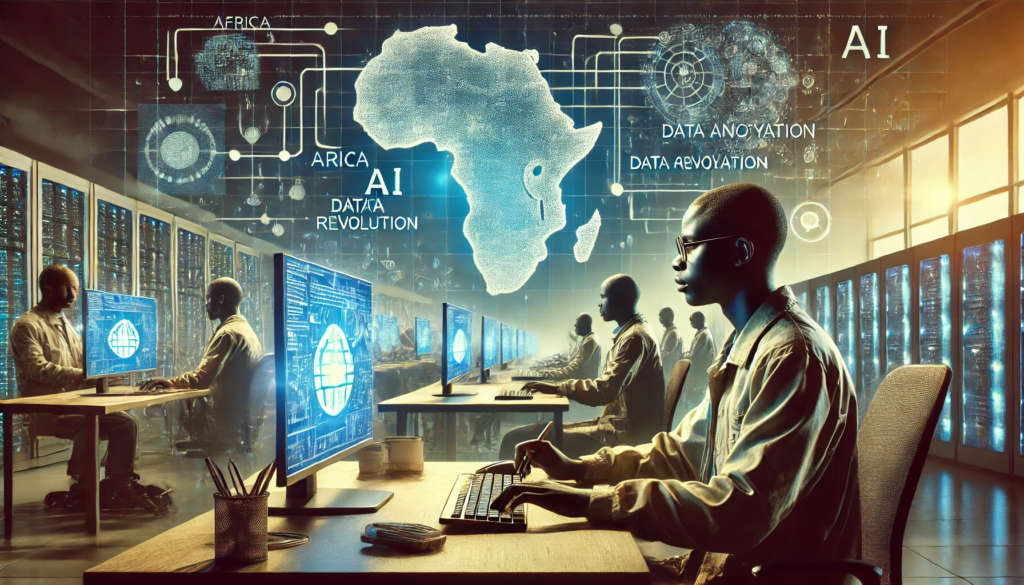The Hidden Human Labor Behind AI: A Critical Examination of Exploitation in the Global South

African workers at data annotation centers play a crucial role in training AI systems, often working in challenging conditions for modest pay.
- What role do African workers play in the AI data annotation industry?
- What are the working conditions like for data annotators in African outsourcing centers?
- How does the global demand for AI training data impact workers in the global south?
The rise of artificial intelligence (AI) has revolutionized numerous industries, from healthcare to finance, promising unprecedented efficiencies and advancements. However, behind the sleek interfaces and intelligent algorithms lies a hidden workforce often overlooked: the data annotators and content moderators. This article delves into the lives of these workers, highlighting the ethical implications and potential future scenarios, based on a recent article from The Guardian and further insights.
The Unseen Faces of AI
In Gulu, Uganda’s largest city, Mercy and Anita are among the many workers employed in business process outsourcing (BPO) centers, performing critical tasks for AI systems. Mercy works as a content moderator for Meta, reviewing graphic and disturbing content to ensure it complies with the platform’s guidelines. On the other hand, Anita is a data annotator, meticulously tagging data to train autonomous vehicle algorithms. These roles are essential for the smooth functioning of AI applications, yet the workers are subjected to harsh conditions and minimal pay, earning just over a dollar an hour.
Mercy’s story is particularly harrowing. One day, she came across a video of a fatal car crash while moderating content. To her horror, she recognized her grandfather among the victims. Despite the emotional trauma, Mercy was expected to continue working to meet her performance targets. This incident is a stark reminder of the psychological toll such jobs can take on workers.
The Reality of Data Annotation and Content Moderation
Content moderation and data annotation are labor-intensive processes that require constant vigilance and precision. Workers like Mercy and Anita spend hours in front of screens, exposed to disturbing content and performing repetitive tasks. They are expected to process hundreds of “tickets” a day, with strict targets for speed and accuracy. The mental strain is immense, with many workers reporting long-term psychological effects.
In Kenya and Uganda, BPO centers operate under stringent conditions. Workers are often on short-term contracts, with minimal job security. They work in rows of desks, under constant surveillance, and are expected to adhere to rigorous performance standards. Those who fail to meet these standards risk losing their jobs, a threat that looms large given the high unemployment rates in these regions.
Ethical Implications and the Role of Big Tech
The exploitation of workers in the Global South raises significant ethical concerns. Companies like Meta outsource content moderation and data annotation to reduce costs, taking advantage of the lower wages in these regions. While these companies benefit from the efficiencies of AI, the workers who power these systems are left to endure poor working conditions and minimal pay.
The ethical implications extend beyond the immediate working conditions. The psychological impact of constant exposure to graphic content cannot be overstated. Many workers report severe mental health issues, including depression and PTSD. The lack of adequate mental health support exacerbates these problems, leaving workers to cope on their own.
Future Scenarios and the Need for Change
As AI continues to evolve, the demand for data annotation and content moderation is likely to increase. The global market for data annotation is expected to grow significantly, reaching over $17 billion by 2030. This growth will inevitably impact workers in the Global South, who will continue to bear the brunt of these labor-intensive processes unless significant changes are made.
To address these issues, tech companies must take responsibility for the working conditions of their outsourced employees. This includes providing fair wages, improving working conditions, and offering comprehensive mental health support. Moreover, there should be greater transparency about the role of human labor in AI development, acknowledging the contributions of these workers.
The Role of Consumers and Policymakers
Consumers also have a role to play in driving change. By demanding greater transparency and ethical practices from tech companies, consumers can pressure these companies to improve the working conditions of their employees. Supporting initiatives and organizations that advocate for workers’ rights in the tech industry is another way consumers can contribute.
Policymakers, too, must step in to regulate the outsourcing practices of tech companies. Implementing stricter labor laws and ensuring compliance can help protect workers in the Global South. International cooperation will be crucial in this regard, as many tech companies operate across borders.
Conclusion
The AI revolution promises many benefits, but it is essential to recognize the human labor that powers these systems. Workers like Mercy and Anita play a critical role in the development and functioning of AI, yet they are often subjected to exploitative conditions. Addressing these issues requires a concerted effort from tech companies, consumers, and policymakers. By shining a light on the hidden labor behind AI, we can work towards a future where technological advancements are achieved ethically and sustainably.
For more insights and detailed analysis, read the full article on The Guardian.




